Birdnesting Divorce: Co-Parenting in the Same House
Could you live in the same house as your ex?
Birdnesting parents choose to take turns living in the family home to spare their kids the trouble of moving. Co-parenting in the same house has become popular due in part to increased awareness about the effects of divorce on children. Like all parenting arrangements, birdnesting has benefits and risks. Consider both before choosing birdnesting divorce.
What is birdnesting divorce?
Birdnesting divorce (also called bird's nest custody or just birdnesting) is a living arrangement that keeps children in the family home while parents take turns living there. When a parent is not in the family home, they live elsewhere. Birdnesting is meant to keep the burden of the divorce on parents rather than children.
While bird's nest custody usually starts after divorce, some try the living arrangement during divorce. This way, each parent gets a fair share of parenting time and the kids don't have to worry about moving in with a parent only to have to switch homes again if that parent doesn't win custody.
Benefits of birdnesting
Not many studies have been done on the effectiveness of birdnesting, yet the arrangement has some potential advantages.
There's less pressure
Going from a two-parent to a one-parent household is a drastic change.
Staying in the family home will give you more time to think about whether you want to sell your home and, if you do, where you'll eventually move that has space for the kids.
You won't have to worry about coordinating exchanges between homes.
You'll also know that the children's living environment is safe. You can agree to let each other know when you're taking the kids elsewhere.
It's easier on the kids
Co-parenting in the same house allows children to stay in familiar surroundings. They won't have to change schools, make new friends or switch between households for visits.
Bird's nest custody could help your children deal with the divorce as they see that the divorce mostly impacts their parents — the ones rotating in and out of the family home. Living with both parents shows children their parents are committed to parenting together despite the separation.
You share parenting responsibilities
In typical co-parenting arrangements, one parent often ends up taking on most of the parenting responsibilities. Birdnesting divorce requires both parents to step up to care for the children and the family home.
Parents can share tasks like cleaning, preparing meals, helping the kids with homework, etc. Plus, both parents get to spend quality time with the kids. They can be there when the kids reach new milestones and make memories in the same home.
Risks of birdnesting
Critics question whether birdnesting is any more effective than regular co-parenting. Keep these risks in mind before choosing birdnest custody.
The kids might get confused
When children see their parents in the same home, they may begin to think they're getting back together. This can make things confusing, especially if you're bringing new partners into the home as well.
There's also a chance that birdnesting could hurt a child's ability to get through the divorce. They might be in denial that their parents have split. Moving between parents' homes may help children deal with the reality of the situation and become better equipped to handle difficulties in the future.
There are more chances for confrontation
Birdnesting could create problems divorced parents are trying to avoid.
You might have different cleaning habits or opinions about who's responsible for stocking food, for example. Also, there are privacy concerns. Are you comfortable leaving your belongings in the birdnest with the other parent?
You might feel trapped
You got divorced for a reason. Staying in the same home could make you feel like you can't break away from the relationship and move on with your life. Potential partners may feel uncomfortable with your living situation, making dating difficult.
You may also want more space from the other parent if you're going through a contentious divorce — for emotional reasons and because you might not want them to have information about your day-to-day life that they could bring up in court.
Things to consider before birdnesting
- Do you get along? Parents need to be on good terms for birdnesting to work. Parents who don't get along or who were estranged should not try bird's nest custody.
- Where will parents live when outside of the birdnest? Some parents choose to share a separate apartment, while others stay with friends or family or have their own apartment or house.
- How far do you live or work from the birdnest? This should factor into when you'll be scheduled to live in the birdnest.
- Can you afford it? Maintaining two properties can be quite expensive. Make sure you've plotted out just how much you'll incur for the birdnest and outside residence.
- Will you birdnest long term? Many parents transition away from birdnesting once the kids get used to parents being apart or once the children reach a certain age.
Tips on how to make birdnesting work
Birdnesting divorce requires extra effort to be successful.
Create a parenting plan
If you decide to birdnest, put clear instructions in a parenting plan.
Beyond a schedule that lays out when each parent will live in the bird's nest, your plan should include terms like:
When will the birdnesting arrangement end?
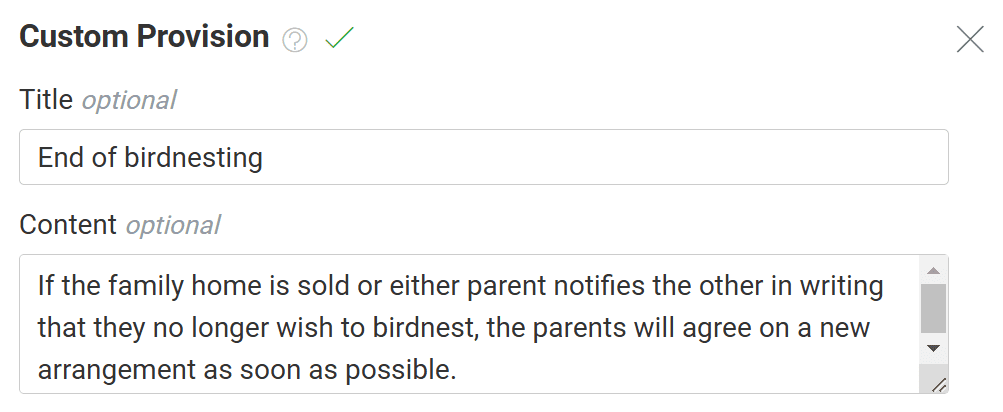 Try this with Custody X Change.
Try this with Custody X Change.Are new partners allowed in the home?
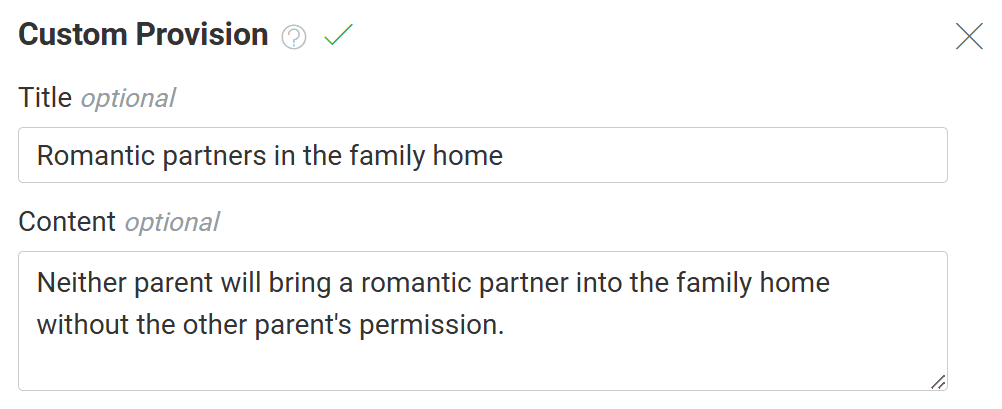
How will you share chores like cleaning?
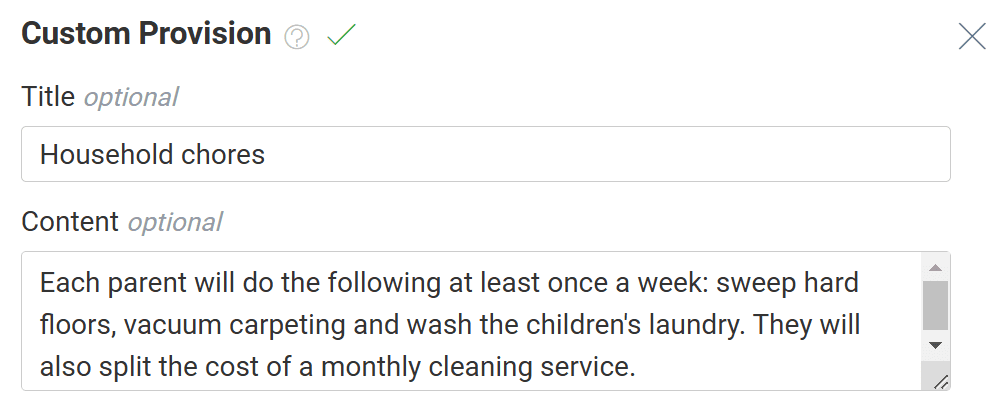
How will you split mortgage or rent payments?
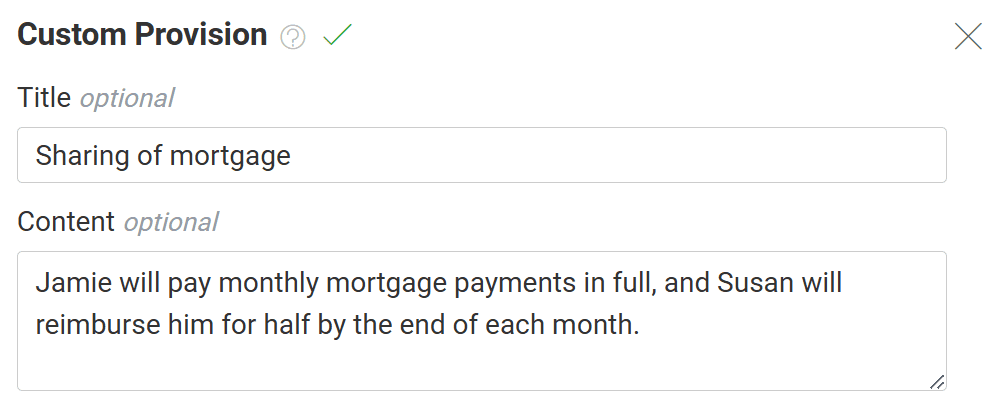
How will you share costs for groceries and other household items?
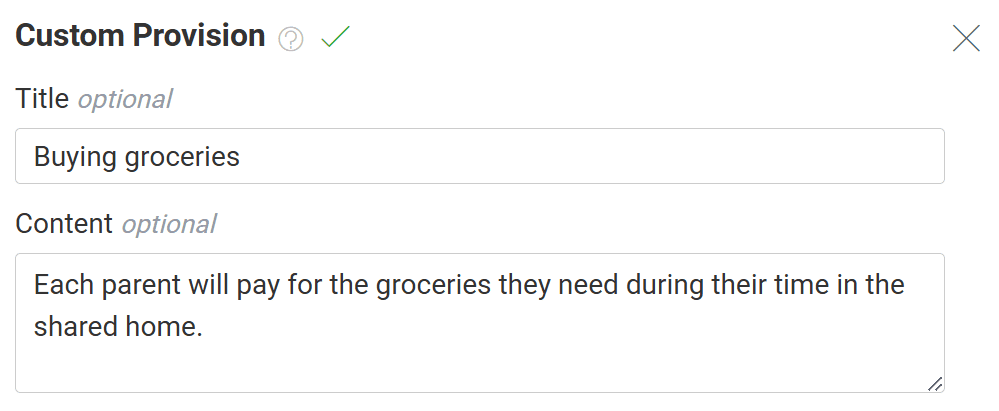
Will you have separate bedrooms?
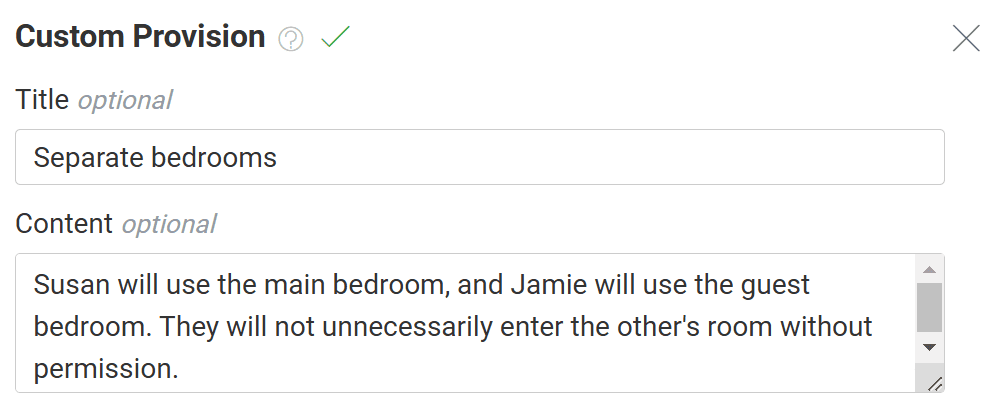
Make it clear you're not reconciling
So the kids don't think you're getting back together, explain the arrangement to them and your reasons for birdnesting. Parents shouldn't enter the home during one another's time.
Stick to a consistent parenting style
Set boundaries for your children and make sure that both parents enforce them. Let kids know their chores, bedtime, curfew, etc. and the repercussions for not complying.
Don't involve the kids in your disagreements
A big reason for choosing bird's nest custody is to spare the kids from conflict. If something upsets you, talk things out in private. If things get especially contentious, consider consulting with a professional to work through your differences.
Communicate effectively
A vital part of birdnesting is being on the same page. Keeping a cleaning schedule and grocery list on the fridge is a straightforward way to communicate your expectations for one another. Also, be upfront about anything that's bothering you within the home, and try to talk through the issue with the other parent so you stay on good terms.
Staying on top of your birdnest custody arrangement
You'll need a thorough parenting plan to make birdnesting work as your living arrangement during or after divorce.
At Custody X Change, we've seen a rise in parents opting to birdnest. Our online app enables parents to create custom custody schedules and lay out the ground rules of their unique living arrangements. All of this is organized into a printable document.
Try this with Custody X Change.
With Custody X Change, manage your birdnesting arrangement with ease and clarity.
